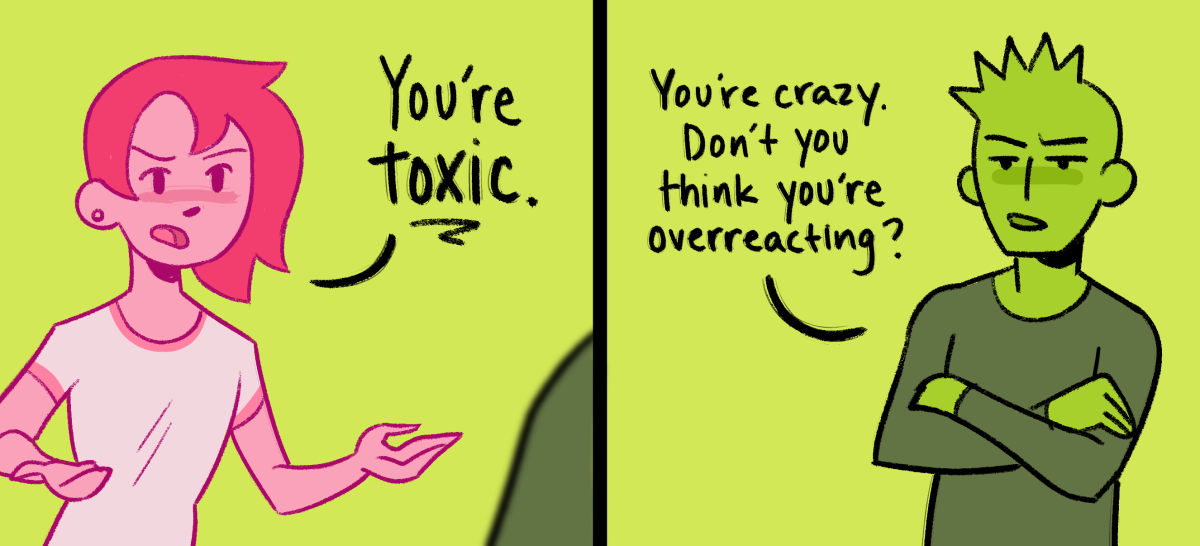If someone is narcissistic or dysfunctional and their behavior causes grief and pain to others, they’re without a doubt toxic.
Toxic people constantly repeat the same negative behavioral patterns regardless of the destructive effects.
If someone in your life exhibits toxic behavior it’s OK, even beneficial, to cut ties with them.
They only care about themselves. They gaslight you while being emotionally manipulative and abusive.
Gaslighting is a manipulation tactic where the abuser manipulates someone by making them question their own reality, according to a June 2020 Psychology Today article. They exploit someone’s insecurities and vulnerabilities.
It shouldn’t matter whether they’re a family member, friend or colleague. They master the art of bringing those around them down and sometimes even play victim when confronted.
Blame shifting is similar to gaslighting, but instead of making the person think they’re crazy, the blame shifter will put the blame on the other individual and make them feel like everything is their fault, according to the same Psychology Today article.
It’s time to take a deep breath, stand your ground and stop making excuses for their bad behaviors.
We struggle to cut out toxic family members mostly because we feel a sense of guilt or family loyalty, according to an Oct. 18, 2019 Psych Central article.
Psych Central breaks down the stigma surrounding mental illness by providing articles written by people who’ve dealt with mental health issues.
Yes, all families are different and some are more connected than others, but typically it’s taboo to cut family members out of your life because family is supposed to “stick together.”
Personally, I broke the taboo practice and cut toxic family members out of my life.
Despite feelings of loss and guilt, I can honestly say it’s made me much happier because my mental health is more important than trying to hold on to a relationship that has only caused me pain.
My mother has bipolar disorder and while I’ve tried everything to maintain some type of relationship with her, it’s always ended badly.
Bipolar disorder is a mental health disorder that causes someone to have extreme mood swings ranging from depressive lows to manic highs. Manic episodes usually make the person act in ways they normally wouldn’t and sometimes can make them become violent. These mood swings can last anywhere from days to weeks.
When she’d have one of her manic episodes, she’d act crazed and call me names, making me feel awful inside.
When she wasn’t acting like that, she’d be very nice and show an interest in my life but I’m constantly on edge wondering when she’s going to go back to her manic state.
My mom also believes in unhinged conspiracy theories that only contribute to her mania.
My final straw was when I told her I got the Pfizer coronavirus vaccine before starting a summer job as a camp counselor and she told me that I would “rot in hell.”
Usually, I go back and forth between talking to her and not talking to her because the idea of not really having a mom is very hard. But, I told myself I wouldn’t be able to endure this type of toxic behavior anymore.
After cutting multiple family members off, I learned it’s OK to remove toxic people from your life if they seriously hinder your energy, emotions and mental state.
I can’t tell you how many times I’ve heard someone say, “they make me feel horrible about myself, but I can’t cut them out of my life because they’re family. Blood is blood.”
Take it from me, if a family member is harmful to your health and growth then you shouldn’t force yourself to endure their never-ending cycle.
This can be harder in a parent-child relationship.
The child might want to cut a parent out of their life, but they feel as if they can’t because they brought them into this world.
The child then has to live with knowing that, as long as that parent stays in their life, they will always be unhappy and will most likely be coping alone.
The abuse can still have a strong hold over the child, even after they have made the step of cutting off their parent.
All the demeaning, insensitive things the parent said to them remain in their head and it’s draining and almost suffocating having to battle off those negative thoughts and emotions.
While people are capable of change, it’s especially hard for those who battle mental illnesses and aren’t seeking help to change their harmful behaviors.
If someone in your family has bipolar disorder or narcissistic personality disorder and is not seeking treatment, it can be extremely hard for them to maintain close interpersonal relationships including with their family members.
Narcissists need to be the center of attention and can be perceived as outgoing and talkative, according to an Aug. 11, 2019 Psychology Today article.
The difference between a narcissist and someone with narcissistic personality disorder is someone with the disorder will use destructive tactics to exploit relationships, according to the same Psychology Today article.
Most of the time, people with narcissistic personality disorder aren’t even aware they’re narcissistic, according to the same article.
As the first step to any problem is recognizing there is one, this makes the path to breaking toxic cycles look nonexistent.
Narcissists destroy everyone who is pulled into their lies and manipulation.
Being raised by a narcissistic parent can lead to many problems with future relationships and damages your self esteem, according to a July 9, 2016 Forbes article.
This can be the case with partners as well.
After someone leaves their toxic or abusive partner, they may end up returning to them several times because it feels “better” than processing the loss that comes with living life without them.
Toxic people, who refuse to notice or even change their hurtful behavior, aren’t worth the damage they cause to you.
If you find yourself asking, “Is this person toxic?” then trust your gut: You already know.









































